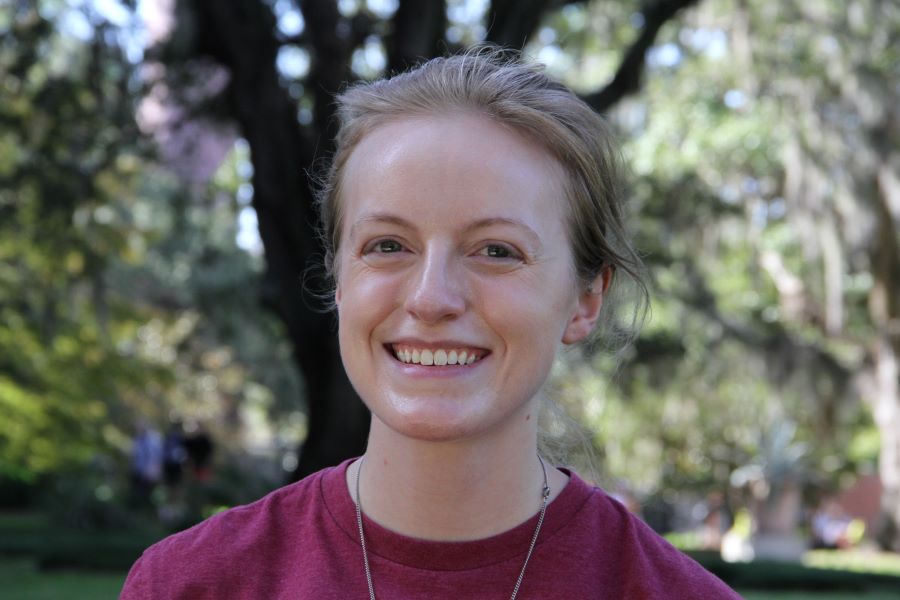Student Spotlight: Danielle Cushing

Danielle Cushing is a doctoral student in the Program in Neuroscience, part of the Department of Psychology in FSU’s College of Arts and Sciences. She currently works in the lab of assistant professor of psychology and neuroscience Aaron Wilber, and her research interests lie in investigating possible causes and treatment options for Alzheimer’s disease. Cushing has published several articles on her research, and she presented her most recent article on impaired brain interactions during sleep at the Alzheimer's Association International Conference this past summer.
What year are you in school, and when do you expect to graduate?
I am in my sixth year as a graduate student. I plan to graduate either this fall or next spring, depending on how long it takes to wrap up my existing projects.
Tell us a little about your background, where you’re from and what brought you to FSU.
I was raised in Colorado and attended the University of New Mexico in Albuquerque for my undergraduate degree. While there, I became interested in studying how the brain works, specifically how Alzheimer’s disease affects brain processes. I worked in associate professor of psychology Ben Clark’s lab on several projects, including one looking at spatial navigation in a rat model of Alzheimer’s disease. Professor Clark was very supportive of my interest in graduate school, and he recommended Aaron Wilber’s lab at FSU. I interviewed with the Wilber Lab and FSU’s Neuroscience program, and I was impressed with the quality of research and training within the program as well as opportunities for collaboration and education.
What inspired you to pursue your areas of study?
I first became interested in studying neuroscience while taking an anatomy and physiology course during my undergraduate career. Shortly after that, I joined Ben Clark’s lab, started taking neuroscience courses, and realized that I wanted to continue on this academic track.
What aspect of your areas of study do you find most rewarding or interesting?
I truly enjoy deepening my own understanding of how our brains process the information that guides human behavior. It is exciting to work at the forefront of answering questions about the brain and what leads us to act in certain ways. I also find it extremely rewarding when I accomplish something in my research using a new technique or analysis after troubleshooting it for a long time.
What has been your favorite project or academic experience at FSU so far?
One of my favorite experiences so far has been developing my own research questions and figuring out how to answer them. I have had the opportunity to study current knowledge on how our brains navigate and guide us through our environments, which has led me to asking questions about what is still unknown in my field and brainstorming how researchers might address these questions, specifically related to Alzheimer’s disease. I was even awarded a fellowship from the National Institute on Aging in 2022 for my work in this area.
Tell us more about your experience during your 2022 fellowship with the National Institute on Aging.
During this fellowship, I worked on a project that investigated communication deficits between brain areas while navigating directions in a mouse model of Alzheimer's disease. One of the earliest symptoms to appear in someone with Alzheimer's disease is getting lost easily, so I looked at some of the possible underlying mechanisms of this symptom in humans by drawing conclusions from a mouse model.
What on-campus resources have you utilized most during your time at FSU?
I have used the Leach Student Recreation Center quite a lot. It enables me to stay fit and focused, and I especially like the free classes offered there.
Are there any faculty or staff who have helped or inspired you? Why/how so?
My mentor, Aaron Wilber, has been a huge supporter of my research and taught me so much about science. Additionally, our lab manager Shawn Moseley has taught me so many techniques and helped me troubleshoot countless experiments over the years. Other faculty members that have helped sharpen my scientific mind and learn new techniques include neuroscience visiting teaching faculty Alina Stimmell, professor of biological science and neuroscience Roberto Vincis, professor of statistics Wei Wu, professor of psychology Chris Schatschneider, and Rick Hyson, professor emeritus of neuroscience.
What do you like to do when you’re not doing schoolwork or research?
I enjoy training and running with my dog, Freyja. I also enjoy yoga, baking, game nights and exploring Florida.
What advice do you have for fellow students?
One of the most important things in graduate school is to find a good community. Find friends who will support and encourage you and push you to be your best self.
Following your graduation, what are your plans? Although you might miss FSU, what are you looking forward to after graduation?
I am currently interviewing for jobs in the fields of psychology and neuroscience. I’m looking forward to hopefully exploring a new city and spending more time with my husband.
